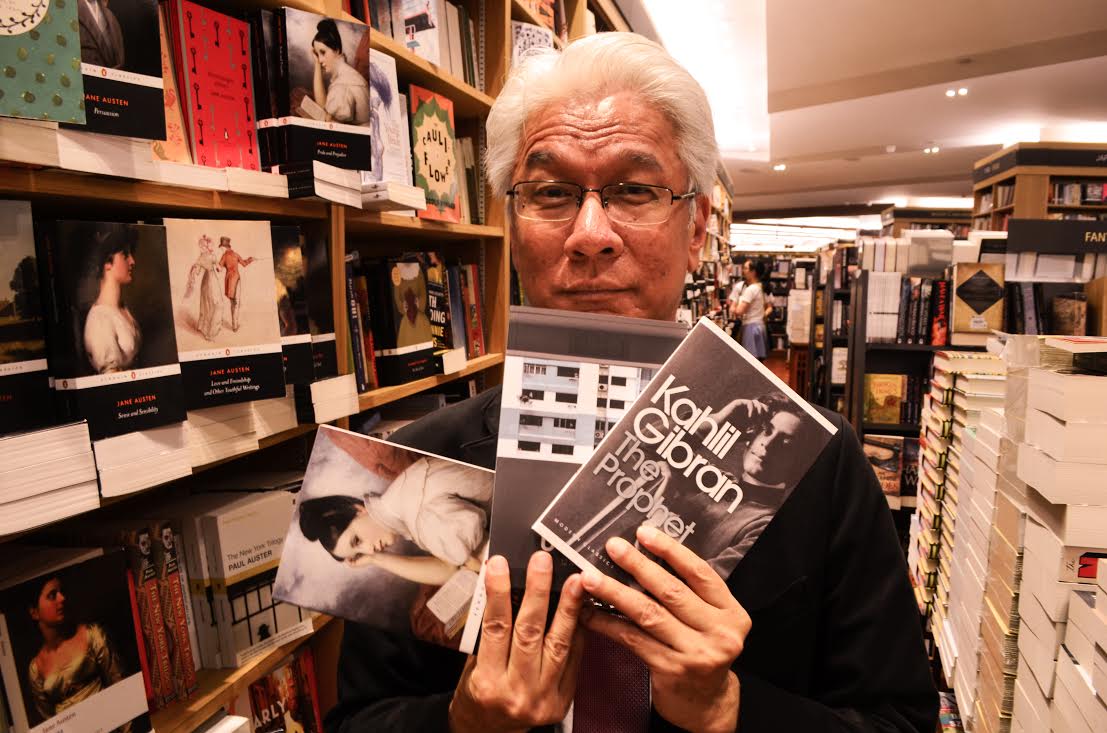“Almost Famous” is a new feature interview series on Mothership.sg. Here, we bring you in-depth stories of people who could be more famous, with a new interview released every fortnight.
It starts with a fax, all the way from Singapore.
And a young Kenny Chan, fresh out of the University of Singapore's Political Science department less than two years prior, finds himself standing at the fax machine in Singapore's High Commission office in London with a new puzzle on his hands.
"Mr Lee read this article in The Listener. It's by a playwright, can you look for it?" reads the cryptic message on the single sheet of paper — the beginning of a mystery book-hunting adventure for Chan, who shares his experience doing just that with us decades on.
How many? We shall not say, for why should numbers matter when Chan attends concerts by Mayday, My Chemical Romance and Katy Perry, and is up to date with the latest music from Gentle Bones and Nathan Hartono?
The faxed requests for book purchases arrived at his desk in a regular stream in the two years Chan spent at the Singapore High Commission in the United Kingdom as Commercial and Information Attaché.
"Luckily for me, I managed to establish good relationships with certain book sellers, so they would be my Sherlock Holmes," he tells us.
"So I will go to them and I ask them, and normally they are very keyed into what is the taste of the people of that time. So I would just say... I would read exactly the same (as what is written on the paper): 'Hi Susan, I'm looking for something that came out in The Listener and it's about a playwright.' 'Oh yes, we have it!' I would say it's no secret, but it's connecting with the right people. People who know."
Sometimes, he says, he got "lucky" and there would be a title in the message, which then made life a whole lot easier for him.
The late Lee wasn't his toughest customer, though — Chan, now Store Director (essentially the man-in-charge) at Kinokuniya in Singapore, says he's had a customer who asked him for a book that he or she saw in the store with the description "it's a hardback, blue colour".
"You can, of course, ask a little bit more, say, 'Oh blue colour...' and then hope for your sixth sense to work," he says with a chuckle. "Normally after awhile you'd have that sixth sense, or should I say in my geek language, the Spidey sense... and that's very important."
We'd love to tell you that it was this experience Chan had as a young man in the Foreign Service that inspired him to go into the book industry, but it wasn't.
Chan's induction to the book and publishing industry started as a job offer from a senior of his at the Ministry of Foreign Affairs (MFA), who was poached by Popular to be its new general manager. By then, he had long been passionate about books, reading and his first love (which endures today), comics, and so figured he could turn his passion into "a career which is new but interesting... not knowing that (he) would be a book seller for life".
All the cool dudes at the MFA read very widely
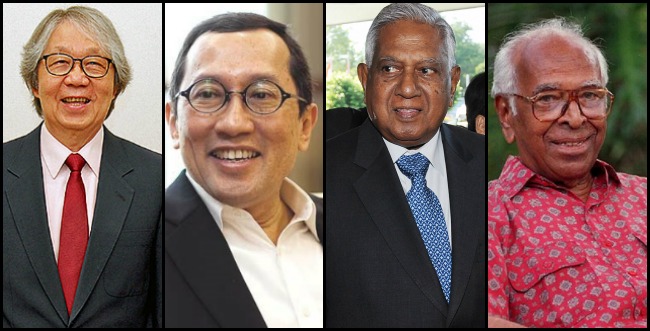 Collage from various sources including Getty Images
Collage from various sources including Getty Images
From the MFA spawned many of Singapore's luminaries and key public intellectuals whom Singaporeans respect and admire today, and Chan, during his six years pacing its hallowed halls, worked with the likes of Ambassadors-at-large Tommy Koh, Bilahari Kausikan, the late S R Nathan and S Rajaratnam, and of course the late PM Lee Kuan Yew.
"Actually... all of us read a lot, and part of my passion for books actually came about when I realised that all the people I admire: Mr Rajaratnam, Professor Tommy Koh, Mr Lee himself, and the rest are all very well-read. Much more than this country bumpkin at the time when I joined them. And I was really impressed by the breadth of reading that they were doing... so we always had that kind of, you know, that great thirst for reading and kaypohness."
He said they would recommend books that would later number among his favourites, like The Rise and Fall of Great Powers by Paul Kennedy and Future Shock by Alvin Toffler, with his most memorable one being The Peter Principle — that in a hierarchy, every employee would rise to their respective level of incompetence.
"So do not rise to that level... don't go up," he jokes. "It's a valid management theory! So you can become assistant director, but don't go up to the next level. Or like for me, store director. Maybe store consultant. Don't go up."
LKY, the "very hard taskmaster"
Chan shares that being knowledgeable about a wide spectrum of topics, issues and themes was important in the foreign service, especially when staffing the late Lee.
"He would ask you questions about anything, so you need to be knowledgeable about a lot of things — especially pertaining to things that would help us to build Singapore better. Which is why he asked questions like, if we were overseas, 'Oh what tree is this? Can this tree be acclimatised to Singapore's climate?' you know, as part of the 'garden city' concept."
He talked more about what working with the late Lee was like as well, book-hunting aside:
"All I can say is Mr Lee is a very hard taskmaster. And the main thing I picked up from him is that nothing is impossible. If he asks you to do something, you will surprise yourself by being able to do it. And he’s always had the interests of Singapore and the Singaporeans in mind.
And like Mr Lim Siong Guan and himself said, that you represent as a Singaporean — not because I was in Foreign Service, but you represent yourself as a Singaporean and you must always remember and be mindful of that because there are a lot of things that you can be proud of."
The Kinokuniya "miracle"
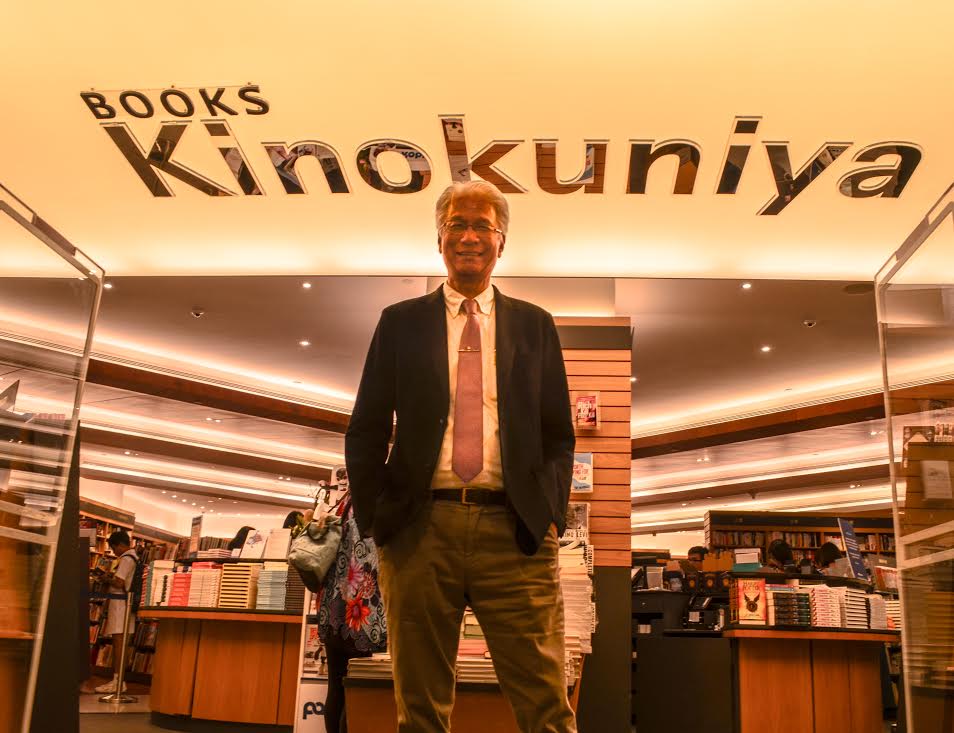 Chan under the Kinokuniya "mothership" light fixture at the rear entrance of the Ngee Ann City flagship bookstore. Photo by Juan Ezwan
Chan under the Kinokuniya "mothership" light fixture at the rear entrance of the Ngee Ann City flagship bookstore. Photo by Juan Ezwan
There are a lot of other fascinating things about Chan's life and work thus far — the above details only his time in the foreign service, which he says he was "seduced by a speech" into joining right out of school, when Ambassador-at-Large Chan Heng Chee spoke on the importance of diplomacy.
"(It was about) being able to connect with people, being well-read, being literate, serving the country in a way that would be fulfilling," he says. "Diplomacy as an important instrument of defence of a country's sovereignty is something not to be taken lightly, and she put it very nicely. Until today I still have that fire in terms of supporting what I feel is Singapore."
But we want to talk about the fact that Kino, as it is known to most Singaporeans too lazy to pronounce its full name, is still so popular and well-patronised, despite the rise of e-books and online book sellers like Book Depository and Amazon.
After talking to Chan, we learned three ways he thinks about Kino and how he runs it:
a) Like a concert venue or a theme park
"Why do people go (to places like USS, Disneyland) again and again and again? Because the experience has always been good for them... So the bookshop must have the experience. Familiar and the new. It must be adjudicated in the right mix, meaning that you like to see things familiar but on the other hand you like to see new things as well. So this has to be done in an environment that is very physical. I find that cyberspace cannot replicate this experience. For instance, that’s why we have so many events in our store; and the events is where you bond with the customer...
Why do you go to the concert, when you can just sit back and just click your Spotify or your iTunes, you know, and listen to music, or YouTube? Because the feeling, the buzz, the feeling of being among the fans; among people you like. Even if you are not a fan, when you are in a Mayday concert for instance which I recently went. The electricity, the feeling is like nothing you can can feel anywhere else even if you listen to music because that is vicarious. This is real time, real experience, that only a physical venue can do for you."
b) Like a news agency
For Chan, this lines up with the idea of connecting with Kino's customers — from updating shop front displays to reflect the latest news items on the minds of people in Singapore (like everything Bob Dylan when he was awarded the Nobel for Literature, and Lee Wei Ling's book at the height of the spat between her and her siblings over the fate of their late father's house) to chatting with customers on the floor to understand what books they're reading or are interested in.
"This is part of my inquisitive nature, and our need to connect with the customers, because these are points of interest to people who are following the news, and so we always have to be able to supply them, or surprise them with things they may feel they need, you know. (It can be) the latest collection of lyrics by Bob Dylan... or all of a sudden Nathan Hartono is a big deal, we have his CDs — all three. Or Gentle Bones...
Book lovers are my favourite kind of people because they are always very aware, very conscious, very concerned about their surroundings and they always need to be fed. And I think we all, in that, try to be in that class, that cluster of people, you know. So I think we need to keep them happy and delighted."
He also shares insight into his choices of material for store front displays, especially when they sometimes make a statement on news and current topics of discussion:
"Sometimes you gotta do it at the spur of the moment, and people like that, you know — the spontaneous things... (and) we do appreciate that you 'got it'... and sometimes it's a bit subtle, because we don't want to be in your face all the time. When we crack jokes, sometimes when people don't get it, we don't care... we've reached the level where I'm okay if you don't get it. If you get it, you laugh tomorrow, I'm fine. So it's like that... it's not all me, it's a group thing."
c) Like a library
If you're looking for books that the government or ruling party frowns upon, like Sonny Liew's The Art of Charlie Chan Hock Chye, books about or by political opposition figures like Chee Soon Juan or Chiam See Tong, Kino's the place where you'll find them for sure.
And yes, Kino also stocks And Tango Makes Three.
"Actually we are a bit like librarians. We are the keeper of knowledge and we are meant to be as neutral as possible under the eyes of the authorities, meaning that we carry anything that will allow reasonable, civilised well-educated men to be able to access knowledge and decide for themselves what’s right and what’s wrong. We are not Judge Dredd. We just offer information that’s available and approved by the authorities to the public.
To be fair the authorities have been much more enlightened in allowing choices to be made. For instance, the fact that despite the withdrawal of the grant, Charlie Chan is still passed and now more or less in the mainstream; it’s proof that we are changing as a society. And to me, it’s better la. We need to be well-informed. Being a cosmopolitan, sophisticated populace, we need to have a place like a good bookshop so that choices can be made for discerning book lovers and anyone."
Kino at Ngee Ann City is one of the Japanese brand's top 5 highest-grossing stores in the world (they've got more than 90 total), including stores from its home country, in no small part thanks to Chan's astuteness and leadership.
"I always try to think everything that I do well is unexpected, but it's a bonus," he says with another boyish chuckle.
Why Borders died
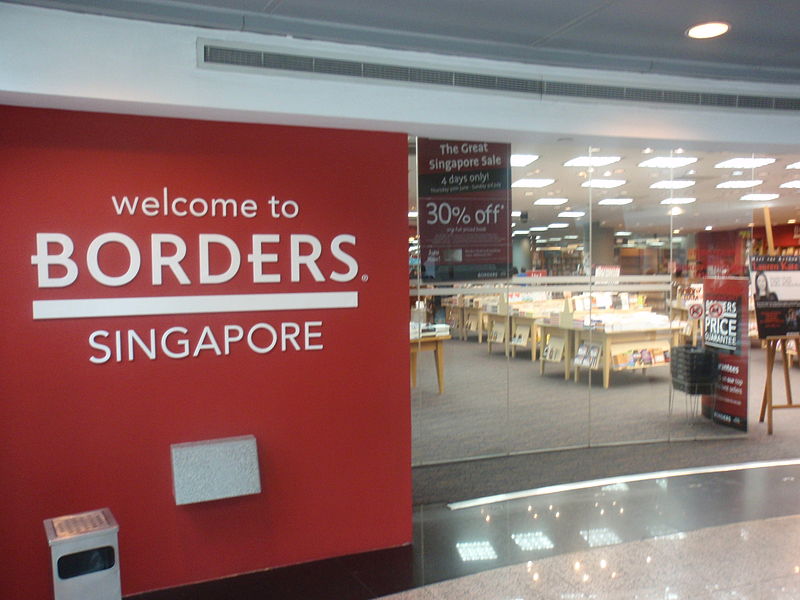 Ah, the hours we whiled away here. (Photo by fieldafar, from Wikipedia)
Ah, the hours we whiled away here. (Photo by fieldafar, from Wikipedia)
We had to also ask him about the other huge bookstore Singaporeans remember and cherish, and why it failed. Interestingly, one of the things Chan said was that Kinokuniya was able to succeed because Borders first came to Singapore.
"When they came to Singapore in 1997 (Kino was around here since 1983), they really created an impact in the market (and this probably led to Kino's decision to open its main store at Takashimaya in 1999) They were the place where everybody who never even thought of going, entering bookshops, went because it was the 'in' thing," he says.
Chan also praised its original circumstances: founded by "a couple of students who were book lovers, and who catered to the crowd that they knew". They also had a "very, very good team of (book) buyers initially", he added.
Eventually, though, corporates took over, with people getting further and further from establishing connections with customers.
"At one stage, the people who did the buying for the Singapore shop were actually based in Australia and New Zealand... the distance sort of lessened their connection with the customer," he said.
Once a long-haired, Woodstock fanatic, and also one-time proud housewife
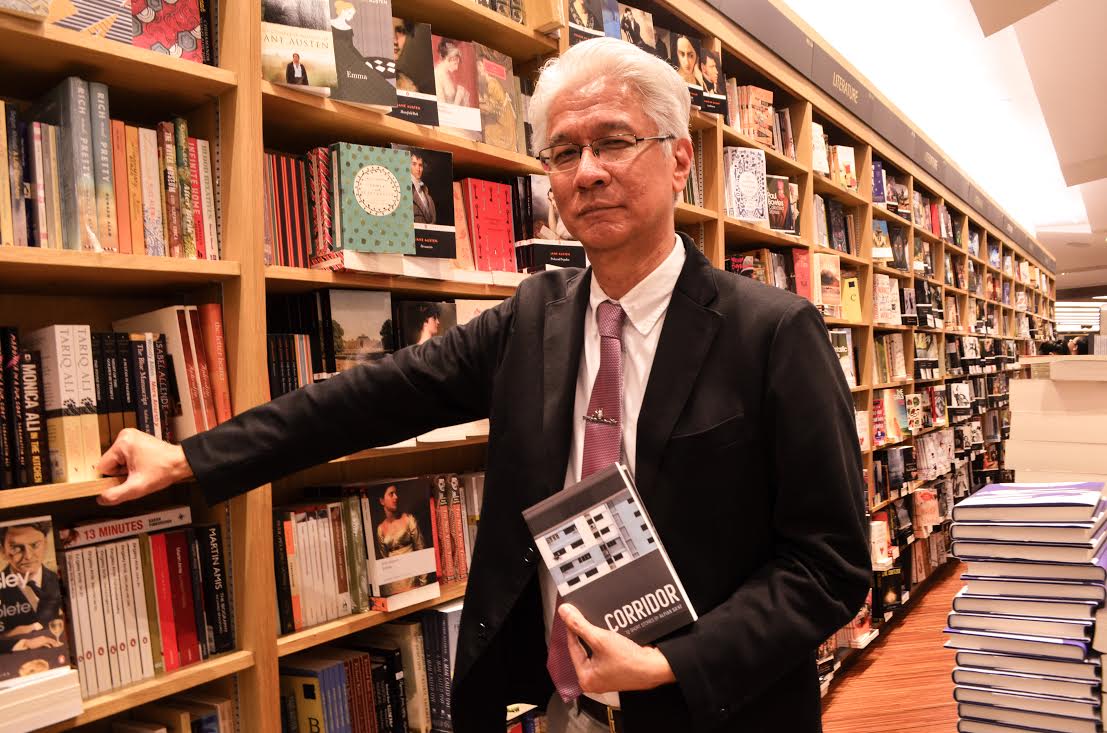 A book by one of his favourite local authors, Alfian Sa'at. Photo by Juan Ezwan
A book by one of his favourite local authors, Alfian Sa'at. Photo by Juan Ezwan
Despite all the people in high places he knows, all the places he's been and all the things he's achieved in the book business, Chan's down-to-earth and affable personality shines through our entire conversation. He has no qualms sharing that he kept long hair in his youth, a hallmark of counterculture in the late 60s and early 70s, and shares triumphantly that he was sufficiently filial to come up with a winning explanation to his father:
"I was filial enough to actually explain to my father why I wanted long hair. I quoted all these role models: Moses had long hair, David Marshall had long hair, Jesus Christ had long hair. So what’s the issue? And my father agreed with me and said yes.
It’s not a question on whether the hair is long: it has to be well kept, it has to be hygienic, meaning wash your hair (he adopts a threatening, booming father-like tone to say this). It’s more important, not about the length but how you maintain yourself and your image, and part of your image is how you keep your hair. It’s all part of personal grooming. And that I’ve never neglected that much."
He ended up cutting it before enlisting to NS, though, after noticing the appearance of a person who looked like him and who also had long hair.
It is also here that he recounts a day he cheekily decided to cut short a geography exam in order to rush home and listen to his neighbour's newly-acquired Woodstock counterculture festival soundtrack.
"I had no choice but to go back early... But I still passed, okay, so I didn't make the wrong choice," he says matter-of-factly (don't try this, kids).
His method of "deliberate procrastination" carried him through university as well, which he says he spent playing billiards and table soccer.
Chan also spent a six-month stint between high-powered bookstore/publisher jobs as... a stay-at-home housewife in Brunei. He tells us his wife was stationed there for two and a half years, and for the bulk of it he shuttled back and forth, but in the final stretch he quit and decided to keep house with his children there while his wife brought in the bread.
Kenny Chan's list of 5 books every Singaporean must read
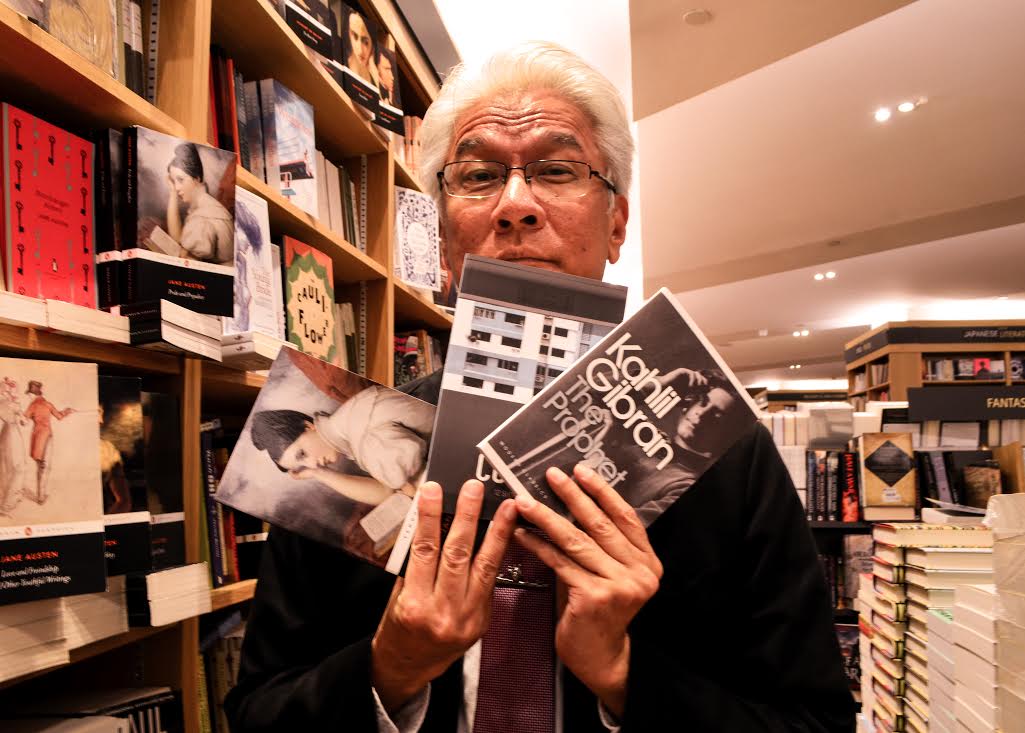 Two of the books in the list are in this photo by Juan Ezwan.
Two of the books in the list are in this photo by Juan Ezwan.
With the thousands of books Chan has read and continues to burn through voraciously, we asked for his list of 5 must-read books for every Singaporean:
1) Future Shock by Alvin Toffler (1970)
2) The Prophet by Kahlil Gibran (1923)
3) The Peter Principle by Laurence J Peter and Raymond Hull (1969)
4) Pride and Prejudice by Jane Austen (1813), and
5) _______________
Why the blank? Chan says it adds to the mystique, and better helps him connect. A fitting way to end our chat, we figured.
So what would you put in that blank?
Top photo of Kenny Chan by Juan Ezwan.
If you like what you read, follow us on Facebook and Twitter to get the latest updates.
If you like what you read, follow us on Facebook, Instagram, Twitter and Telegram to get the latest updates.
